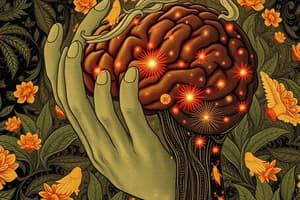Podcast
Questions and Answers
What is the primary function of attention in the process of memory?
What is the primary function of attention in the process of memory?
- Facilitating the encoding of all types of information
- Enhancing retrieval of stored memories
- Focusing awareness on certain stimuli (correct)
- Improving storage capacity
Which type of memory is responsible for holding information for a few seconds or less?
Which type of memory is responsible for holding information for a few seconds or less?
- Short-term memory
- Long-term memory
- Working memory
- Sensory memory (correct)
What phenomenon describes the tendency to remember the first and last items in a list?
What phenomenon describes the tendency to remember the first and last items in a list?
- Interference effect
- Echoic memory effect
- Visual imagery effect
- Serial position effect (correct)
Which memory type involves knowledge about facts and events from personal experience?
Which memory type involves knowledge about facts and events from personal experience?
What is a key characteristic of working memory?
What is a key characteristic of working memory?
Which factor can lead to forgetting information in memory?
Which factor can lead to forgetting information in memory?
How does visualization aid in the memory process?
How does visualization aid in the memory process?
What type of memory is specifically responsible for skills and actions?
What type of memory is specifically responsible for skills and actions?
What is classical conditioning primarily concerned with?
What is classical conditioning primarily concerned with?
Which of the following best describes extinction in classical conditioning?
Which of the following best describes extinction in classical conditioning?
In operant conditioning, what does the Law of Effect state?
In operant conditioning, what does the Law of Effect state?
What is the main goal of shaping in operant conditioning?
What is the main goal of shaping in operant conditioning?
What type of reinforcement schedule involves providing rewards after an unpredictable number of responses?
What type of reinforcement schedule involves providing rewards after an unpredictable number of responses?
Which type of intelligence is primarily focused on problem-solving and logic according to Sternberg's Triarchic Theory?
Which type of intelligence is primarily focused on problem-solving and logic according to Sternberg's Triarchic Theory?
What does Bandura's concept of observational learning suggest?
What does Bandura's concept of observational learning suggest?
Which of the following is an example of negative reinforcement?
Which of the following is an example of negative reinforcement?
What is the Flynn Effect mainly concerned with?
What is the Flynn Effect mainly concerned with?
Which process refers to the recovery of a conditioned response after a period of absence from the conditioned stimulus?
Which process refers to the recovery of a conditioned response after a period of absence from the conditioned stimulus?
Which method did Alfred Binet use to measure children's intellectual development?
Which method did Alfred Binet use to measure children's intellectual development?
What defines the concept of stimulus discrimination?
What defines the concept of stimulus discrimination?
What is the primary focus of behaviorism in studying psychology?
What is the primary focus of behaviorism in studying psychology?
What characterizes positive punishment in behavioral terms?
What characterizes positive punishment in behavioral terms?
Flashcards are hidden until you start studying
Study Notes
Memory
- Encoding is the process of converting information into a form that can be stored in memory.
- Deeper processing leads to more durable memory codes.
- Visual imagery can enhance encoding.
- We are particularly good at remembering words linked to ourselves.
- Retrieval is the process of accessing information stored in memory.
- Retrieval cues, such as the context of a memory, can help jog memories.
- Sensory Memory is the first stage of memory, holding an exact copy of sensory information for a brief period (a few seconds or less).
- Iconic memory refers to visual information, while echoic memory refers to auditory information.
- Short-Term Memory (STM) is the second stage of memory, holding information for about 10 seconds.
- STM is highly sensitive to interference and decay.
- Working Memory is the second stage of memory that combines STM with other mental processes, allowing us to manipulate and process information in the moment.
- Long-Term Memory (LTM) is the third stage of memory, with a vast storage capacity and the ability to hold information for extended periods.
- Declarative Memory stores factual information.
- Semantic Memory stores general knowledge.
- Episodic Memory stores personal experiences with a specific date and time.
- Procedural Memory stores memories for actions and skills.
- Forgetting can occur due to failure to encode information, interference from other memories, or retrieval problems.
- The Serial Position Effect describes the tendency to remember items at the beginning (primacy effect) and end (recency effect) of a list better than items in the middle.
Learning
- Learning is a relatively permanent change in behavior due to experience, involving acquired knowledge and measured behaviorally.
- Behaviorism focuses solely on observable behavior, excluding mental processes.
- Associative Learning involves linking two events that occur close in time.
- Conditioning is the process of learning associations.
- Classical Conditioning involves associating two stimuli and anticipating an event, resulting in a physiological reaction.
- Operant Conditioning associates a response with a consequence, guiding future behavior.
Classical Conditioning
- Pavlov's Experiment demonstrates classical conditioning.
- Before conditioning, a neutral stimulus (e.g., a tone) does not elicit a response, while an unconditioned stimulus (e.g., food) produces an unconditioned response (e.g., salivation).
- During conditioning, the neutral stimulus (NS) is paired with the unconditioned stimulus (US), resulting in the unconditioned response (UR).
- After conditioning, the neutral stimulus (now a conditioned stimulus, CS) elicits the unconditioned response (now a conditioned response, CR).
- Basic Processes of Classical Conditioning:
- Acquisition is the initial stage of learning the association.
- Extinction is the gradual weakening and disappearance of the conditioned response (CR).
- Spontaneous Recovery is the reappearance of an extinguished response after a period without exposure to the conditioned stimulus (CS).
- Stimulus Generalization is the tendency to respond to stimuli similar to the CS.
- Stimulus Discrimination is the learned ability to distinguish between a CS and similar stimuli.
Operant Conditioning
- Operant Conditioning is a form of learning where voluntary responses are controlled by their consequences.
- The Law of Effect states that responses leading to desirable effects are repeated, while those producing undesirable responses are not.
- Acquisition refers to the formation of a new response tendency.
- Shaping involves rewarding successive approximations of a desired behavior.
- Types of Reinforcement:
- Positive Reinforcement: strengthens a response by adding something desirable.
- Negative Reinforcement: strengthens a response by removing something aversive (not punishment).
- Reinforcement Schedules:
- Continuous Reinforcement: Every instance of a designated response is rewarded.
- Intermittent Reinforcement: A designated response is reinforced only some of the times.
- Ratio Schedules emphasize the rate of responding.
- Fixed-Ratio: Reinforcer is given after a fixed number of non-reinforced responses.
- Variable-Ratio: Reinforcer is given after a variable number of non-reinforced responses.
- Interval Schedules emphasize the timing of responding.
- Fixed-Interval: Reinforcer is given for the first response after a fixed time interval has elapsed.
- Variable-Interval: Reinforcer is given for the first response after a variable time interval has elapsed.
- Punishment is a consequence that weakens a response.
- Positive Punishment involves the presentation of an aversive stimulus.
- Negative Punishment involves the removal of a rewarding stimulus.
Observational Learning
- Observational Learning occurs when an organism's response is influenced by observing others. (Bandura's Bobo Doll Study is a classic example.)
Intelligence
- Intelligence is the capacity to act purposively, think rationally, and deal effectively with the environment.
- General Mental Abilities form the core of intelligence.
- Theories of Intelligence:
- The G-Factor Theory posits a single underlying general intelligence factor.
- Gardner's Multiple Intelligences Theory suggests eight distinct intelligences.
- Sternberg's Triarchic Theory proposes three types of intelligence: analytical, creative, and practical.
- The Origins of Intelligence Testing:
- Alfred Binet developed the first intelligence test to measure children's "mental age" compared to their chronological age.
- The Stanford-Binet IQ test is based on Binet's work.
- The Wechsler Adult Intelligence Scale (WAIS) provides an IQ score and separate scores for verbal and performance intelligences.
- Heritability and Environment:
- Intelligence is largely inherited: Intelligence runs in families, with evidence from twin and adoption studies.
- The Environment Plays a Role: Environmental deprivation and enrichment can impact intelligence.
- The Flynn Effect shows a steady increase in IQ test performance across generations, likely due to factors like improved education and technology access.
- Reaction Ranges: Heredity sets limits on intelligence, while environment determines where individuals fall within those limits.
Studying That Suits You
Use AI to generate personalized quizzes and flashcards to suit your learning preferences.




